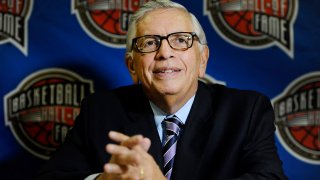
The traditional role of the commissioner of a professional sport is to serve at the behest of those who own the teams. To listen to the empowered and act upon their desires. They are supervisors, and the commissioner is the chief subordinate.
David Stern set fire to that script when he ran the NBA, probably grinning as it burned.
No commissioner in any American sport has so successfully changed the typical dynamic, forcing slack-jawed owners to do more listening than talking.
Stay in the game with the latest updates on your beloved Bay Area and California sports teams! Sign up here for our All Access Daily newsletter.
For a full 30 years, from 1984 until 2014, Stern was a straight-up boss, walking any way he pleased while carrying a stick big enough to wallop anybody in his path. He was determined to do not what was best for the owners but what was best for the NBA. Which meant the players -- those who attracted ticket-buyers and TV contracts -- would be visible and have a voice, if initially only through marketing.
Stern was going to run the league his way, and any owner that dared to try to bully him invited a one-sided confrontation with the back of his hand, followed by the heel of his boot. And, maybe, a sharp word or two as punctuation.
Understand, though, it was no different for a player -- unless Stern deemed that player’s profile essential to the prosperity of NBA. In those instances, Stern might revert to his area of expertise and actually negotiate.
“For me, personally, we're talking about somebody who was my mentor,” Warriors chief operating officer Rick Welts said in a statement. “I used to joke that my greatest success in life was directly reporting to David Stern for 17 years and living to tell about it, because it was some days an amazing challenge. I had a complicated relationship with him, like everybody else, but at the end of the day, he was a friend.”
Golden State Warriors
“Complicated relationship” is, in this case, a euphemism for admire-hate. Stern was dictatorial in approach but quick to recognize the quality work of others. That boss you hate but realize his vision provides most of the horsepower in the workplace. A prickly genius.
Stern, who died on New Year’s Day at age 77, was able to get away with such quarrelsome conduct because in his first few years as commissioner he masterfully oversaw an altering of the league’s image that put it on a trajectory that resulted in unprecedented popularity and prosperity. Among American professional sports leagues, the NBA was a distant third to the NFL and MLB when Stern took over. During his watch, it became a global force.
Some owners griped about Stern in private, largely because they’d never seen anything like him, but they were thrilled with the abundant revenue. They might have imagined such wealth, but they’d never experienced it.
“He modernized the NBA,” Warriors general manager Bob Myers said in a statement. “He had a great strength of conviction, kind of force-of-nature type personality to move the league in the direction that he wanted it to go.”
Stern’s journey to the top of the NBA began in the mid-1970s, when as a pit bull of an attorney under the umbrella of a high-powered legal firm, he negotiated a settlement between the NBA and its players that opened the window to players to have free agency and the NBA and ABA to merge. In 1978, at age 35, assumed the role of NBA general counsel.
He was 41 when he became commissioner of a league with 23 franchises that in the previous year generated $165 million in revenue and had so little clout its playoff games were often shown via tape-delay.
When Stern stepped down, the league was up to 30 teams and, moreover, revenue was up to $5.5 billion and its playoff games were shown live in more than 200 countries.
[RELATED: David Stern's NBA legacy not lost on Warriors' brain trust]
"Everybody who's part of the NBA, we all owe him a great debt of gratitude for his service, for his impact and for everything he has done for our own individual lives," Warriors coach Steve Kerr said in a statement.
“I don't think there's any doubt,” Welts said, “that he is the single-most-important individual in the history of the NBA.”
Argue against that, if you must, by citing the list of great players that have passed through the league. But every cogent argument circles back to Stern, whose leadership polished the NBA and intensified the wattage of spotlights above it.


